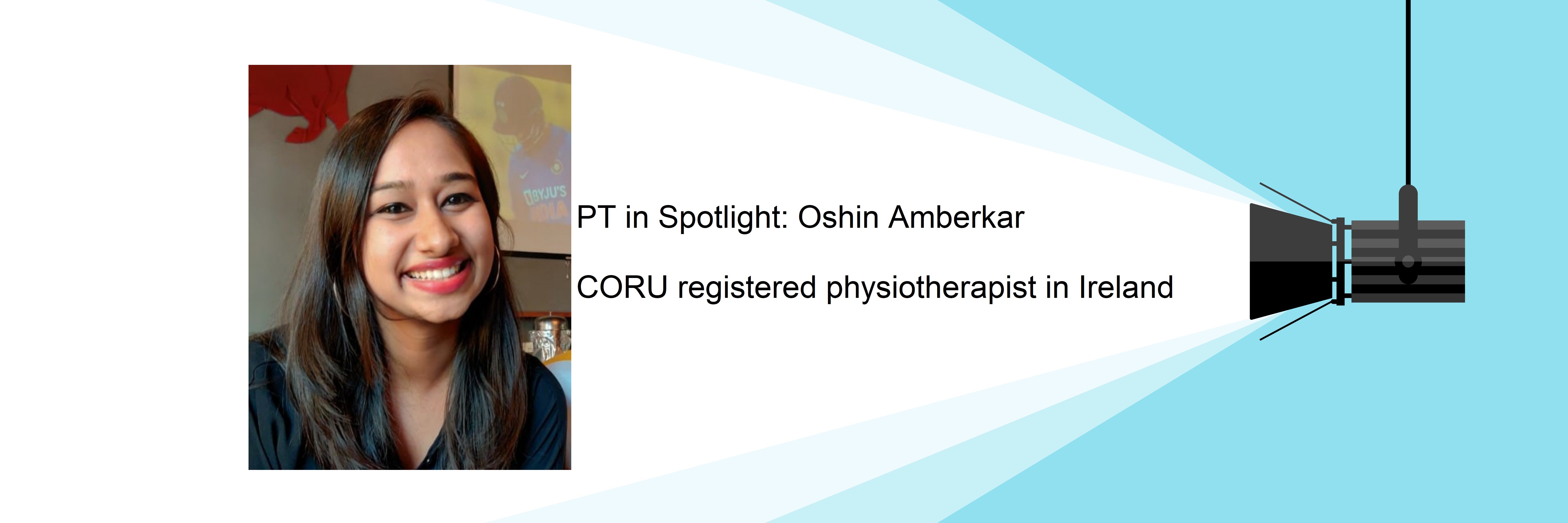
This week’s spotlight features Oshin Amberkar. She is an Indian physiotherapist in Ireland. She moved to Ireland after getting married. In this spotlight, Oshin shares her journey to get registered and start working in Ireland. Oshin also shades light on CORU, a regulatory body for health professions in Ireland. She describes the process she went through with CORU. Go ahead and read this spotlight to have a better understanding of the registration process for physiotherapists in Ireland.
What is your name, workplace and job title?
Oshin Amberkar, Consulting Physiotherapist, John Butler Sports Therapy Clinic, Ireland.
What is your educational background?
- Masters in physiotherapy (MPTh), Sports Physiotherapy, MGM college of physiotherapy. Graduation year, 2019
- Bachelors of physiotherapy (BPTh), PES Modern College of Physiotherapy. Graduation year, 2016
Why did you pursue a Masters in sports physiotherapy?
After my graduation, I took a gap year. I worked in Nanavati for a while. Ever since graduation, I was pretty clear that I wanted to pursue a Master’s in Sports since I am an athlete myself. So to get an exposure of sports physiotherapy, I started working at Prakruti sports clinic.
I left Prakruti after 5 months. Soon, I started working with Yuvraj Sir at his clinic. Through him I came to know about the Master’s in sports physiotherapy course at MGM. As I pursued my Master’s over there, I continued working with Yuvraj Sir at his clinic. He has been a great mentor for me throughout my career.
What did you do soon after your Master’s?
After my masters, I started observership H N Reliance hospital. I got to learn a lot during my observership. Meanwhile, I also got the offer to work as a personal physiotherapist for Seema Punia, Olympics discus throw player. Unfortunately because of the lock-down I couldn’t go through with it. During this time, I continued working with Yuvraj Sir at his clinic.
During the second lock down, I got a call to work with the Elite Indian Women’s Boxing Team. I worked with them for 4 months. During the second wave, in our team of 26 people, 21 people tested positive for Covid 19. I couldn’t accompany the team for the Olympics due to the pandemic restriction.
When and why did you decide to move to Ireland?
I decided to move to Ireland because my husband works there. I started my registration process with CORU back in September 2020. My process was halted for 2 months in Jan 2021 due to the pandemic.
So, what was the process like for an Indian physiotherapist in Ireland to start working as a PT?
As I mentioned I am in Ireland on a dependent Visa. Foreign trained PTs need to be registered with CORU. CORU is basically a regulatory body in Ireland that regulates various health professions. It is a two step process: recognition and registration.
Recognition is when they recognize your education from India and they decide that you are qualified to work in Ireland. That is the most important and oftentimes, consuming process. You will have to fill out a form that has all your details. Right from education to job placements. The form is lengthy and detailed to fill out. It takes a lot of time.
The good part was, I could email the form to them. Due to the pandemic, CORU changed the mode of operation. So instead of sending a form through post, I could do it online. I sent the form several times. Every time, the form came back with some queries. Until July 2021, when I finally got my recognition.
I would suggest that if you are trying to obtain recognition from CORU, fill out the form by yourself first. Make sure to include all the details. Once you fill out the form, email it to the CORU office to check if the format is correct. Keep on doing the changes suggested in the queries and keep on sending it back for the review. Once they okay it, have your college mail the most updated form to CORU.
What are some of the documents that you had to submit?
They need your IAP membership certificate. Apart from that, they need a ‘Good Standing’ certificate from all your colleges and employers. My employers also had to show documents such as OTPT registration, degree etc. I think it is quite a strict scrutiny.
What if your education does not meet the requirements for CORU recognition?
Fortunately, my education from India met all the CORU requirements. I think, if your education falls short of eligibility, you can do some credit courses in India to meet the criteria. As I said, I wasn’t required to do anything additional so I can’t say it for sure.
What is the next step after recognition?
The next and final step is registration. For that, I needed the Police clearance certificate from India. I needed to give the academic IELTS. They will also ask you about the address details. You are required to mention all the addresses you lived on since your birth. Along with that, I had to submit passport details.
They also have an e-vetting form. This is basically a Police clearance certificate from Ireland. I did this step after reaching Ireland. Registration takes about 3 months.
I am happy to say that as of November 2021, I am a registered physiotherapist in Ireland.
How much was the overall expense for the CORU registration process?
Recognition was €400 and registration was €100. Additionally, I had to incur expenses to obtain transcripts, other documents from India as well as IELTS fees.
What are the ways an Indian PT can move to Ireland for work, apart from going on a dependent visa?
What I would suggest is that they can start applying for the jobs in Ireland on Indeed/LinkedIn. They will need to find an employer who is willing to sponsor their work visa for Ireland. Physiotherapy is on a critical skills visa. So, I think, the chances of getting a work visa is good.
Needless to say, they will need to complete CORU registration first.
Another way is to obtain a masters from Ireland, get registered with CORU and look for an employer to sponsor your work visa.
What is a typical day at work for you as a physiotherapist in Ireland?
I am currently employed in a Private Msk-Sports Clinical set up(John Butler Sports Therapy). The hours here are flexible, based on patient appointment timings.
Usually on a busy day the day starts at around 9am, with each patient being given 1 hour for their session which is completely one to one. Due to Covid, the sheets are being changed after every patient, so there is a 15-20 minute break between each patient.
Here there is a gym area, 4 separate treatment rooms and a cryotherapy bath room for recovery. There are up to 6-7 patients per day on busy days for each physio.
They do have a couple of electrotherapy modalities like Ultrasound and TENS, but they hardly use them. It’s mostly Manual therapy, exercise therapy, Soft tissue mobilisation and dry needling.
As a Indian physiotherapist in Ireland, what do you think are the similarities and differences work-wise in both countries?
The MSK cases here are quite similar to what we have back in India, Its mainly low back, neck, shoulder, sometimes knee, ankle etc.
The population here is quite active. I noticed that health literacy among them is moderately higher than back home. People are aware of the health benefits of staying active, most of them either Run/cycle on a regular basis, while others go to the gym. The younger population below 30s are into sports recreationally.
The sports here are very different than in India. Here you will see sports such as Hurling, Gaelic football, Camogie (female version of hurling), Rugby, Soccer.Golf and horse racing are quite common here. At my clinic, we have a tie up with the Irish Horse Racing Association, treating Jockeys there.
We also use weights up to 50kgs for treating athletes/patients with back pain in their late stage of rehab, which is not a popular choice with Indian Physios and patients yet. Though slowly this is changing in India. Having a strength and conditioning/Pilates/ yoga experience would be an add on and could put you in preference while applying for jobs here.
There is a huge emphasis on patient privacy here due to GDPR (EU General Data Protection Regulations), which isn’t as strict back in India.
What do you like about your work in Ireland?
I am happy that my current employer is very open to ideas. The patients here are very friendly and open to try new things. I was quite nervous initially about mixing up with Irish people, as this was my first time in a foreign country with foreign clients, but I could gel in easily.
I haven’t experienced any kind of racism so far, nor heard anything like this happen to anyone around. And of course the best part is weekends are off! European culture takes weekends very seriously, you must be off on weekends and chill with friends.Though there are a few clinics who work half days on weekends.
The pay here is fairly good as well. Plus, Physiotherapy is on a critical skills visa. So, I think, the chances of getting a work visa is good.
What is your advice for someone who wants to be an Indian physiotherapist in Ireland?
It is a good opportunity. There is a lot of scope for geriatric PT and long term care. Sports physiotherapy is also in demand over here. Ireland is one of the English speaking countries in Europe. So Indian physiotherapist in Ireland can adjust well.
Where can people reach you?
They can reach out to me on LinkedIn.
Hello, My name is Tejashree Limaye. I am a physiotherapist with 10+ years of experience. I help you go from being stuck in your career to finding a job you love! I provide career guidance about clinical and non clinical PT career in India. I also help you with US PT licensing process. Welcome to my blog, I hope you find the exact guidance you have been looking for!
